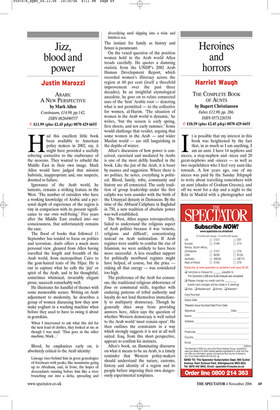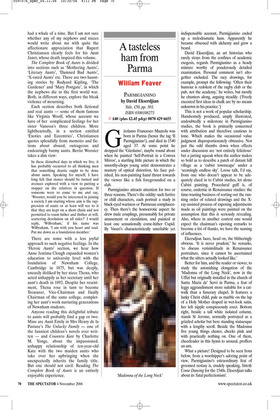Heroines and horrors
Harriet Waugh
THE COMPLETE BOOK OF AUNTS by Rupert Christiansen Faber, £12.99, pp. 266, ISBN 0571226558 V £10.39 (plus £2.45 p&p) 0870 429 6655 It is possible that my interest in this book was heightened by the fact that, in as much as I am anything, I am an aunt. I have 14 nephews and nieces, a step-nephew and -niece and 20 great-nephews and -nieces — as well as two stepchildren who I feel very aunt-like towards. A few years ago, one of my nieces was paid by the Sunday Telegraph to write about travelling somewhere with an aunt (shades of Graham Greene), and off we went for a day and a night to the Ritz in Madrid with a photographer and had a whale of a time. But I am not sure whether any of my nephews and nieces would write about me with quite the affectionate appreciation that Rupert Christiansen clearly feels for his Aunt Janet, whose death inspired this volume.
The Complete Book of Aunts is divided into sections such as ‘Mothering Aunts’, ‘Literary Aunts’, ‘Damned Bad Aunts’, ‘X-rated Aunts’ etc. There are two haunting stories by Rudyard Kipling, ‘The Gardener’ and ‘Mary Postgate’, in which the nephews die in the first world war. Both, in different ways, explore the bleak violence of mourning.
Each section describes both fictional and real aunts — some of them famous like Virginia Woolf, whose account we have of her complicated feelings for her sister Vanessa’s three children. More lightheartedly, in a section entitled ‘Exotics and Eccentrics’, Christiansen quotes splendidly from memoirs and fictions about absurd, outrageous and endearingly barmy aunts. Bertie Wooster takes a dim view:
In these disturbed days in which we live, it has probably occurred to all thinking men that something drastic ought to be done about aunts. Speaking for myself, I have long felt that stones should be turned and avenues explored with a view to putting a stopper on the relatives in question. If someone were to come to me and say, ‘Wooster, would you be interested in joining a society I am starting whose aim is the suppression of aunts or at least will see to it that they are kept on a short chain and not permitted to roam hither and thither at will, scattering desolation on all sides?’ I would reply, ‘Wilbraham,’ if his name was Wilbraham, ‘I am with you heart and soul. Put me down as a foundation member.’
There are some with a less joyful approach to such negative feelings. In the ‘Heroic Aunts’ section, we hear how Anne Jemima Clough expanded women’s education to university level with the foundation of Newnham College, Cambridge in 1875, but was deeply, uneasily disliked by her niece Thena, who acted unhappily as her secretary until her aunt’s death in 1892. Despite her resentment, Thena rose in turn to become Treasurer, Vice-Chairman and finally Chairman of the same college, completing her aunt’s work nurturing generations of Newnham students.
Anyone reading this delightful tribute to aunts will probably find a gap or two. Mine are Aunt Emily in Mrs Henry de la Pasture’s The Unlucky Family — one of the funniest children’s novels ever written — and Countess Kate by Charlotte M. Yonge, about the impassioned, unhappy relationship of ten-year-old Kate with the two maiden aunts who take over her upbringing when she unexpectedly inherits the family title. But one should not cavil. Reading The Complete Book of Aunts is an entirely enjoyable experience.



















































































































 Previous page
Previous page